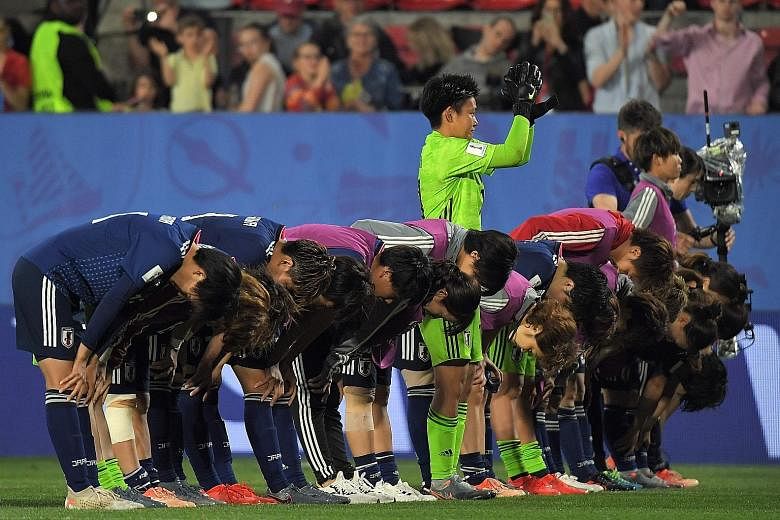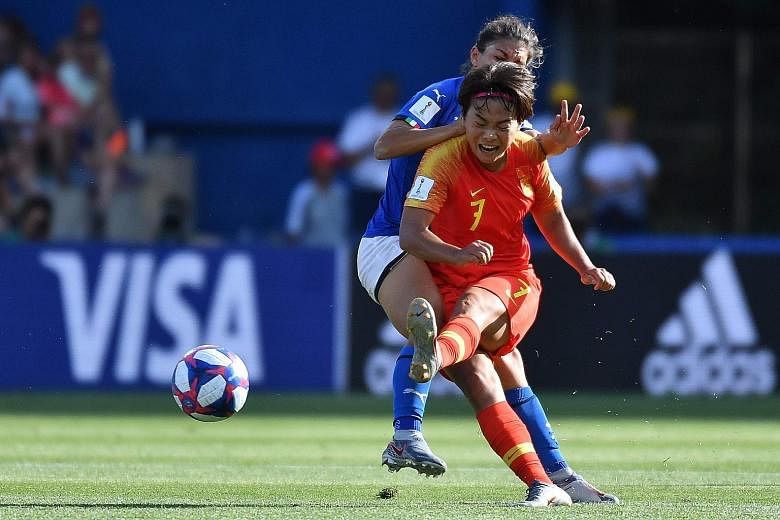RENNES • Even though Japan essentially brought their Under-23 squad to the Women's World Cup, hopes had still been high that the youngest among the 24 teams in France could replicate their rousing maiden triumph in 2011.
Back home, the Nadeshiko were expected to match their run to the 2015 final in Canada, where they lost 5-2 to the United States.
But a "cruel" last-gasp 2-1 round-of-16 loss to European champions the Netherlands had coach Asako Takakura admitting that there was plenty to work on as "our team is not the same as in 2011 or in 2015".
Lieke Martens converted a 90th-minute spot kick, which was given and confirmed by the video assistant referee (VAR) after Vivianne Miedema's shot had struck the arm of captain Saki Kumagai in the box.
On Tuesday, it was a desperately disappointing way for Japan to go out as they had been the better side once Yui Hasegawa cancelled out Martens' early opener, dominating the possession while also hitting the woodwork twice.
Takakura was left to rue Japan's lack of clinical finishing, claiming "it was a match we really could have won".
Brushing off the gripes over the penalty decision as "VAR exists", she said: "We created lots of chances and it was unfortunate that we didn't take them.
"We have been beaten and we are very disappointed. I am really sorry for my players. Today, it went against us. We need to look forward and accept the decision."
Six of the starting line-up in Rennes were aged 23 or under, as Japan opted to send a relatively untested team, with 17 making their Cup bow, to blood them ahead of next year's Tokyo Olympics.
And the former Under-20 boss conceded having the youngest team at the event played into the hands of European opponents.
Like England, who beat Japan 2-0 in the group stage, the Dutch were able to use their physicality to combat the nimbleness of her players.
Takakura said: "We've been conscious about the physical size as we're not as tall or as strong as European players.
"Individually, it's obvious that we don't have as much power as them and we have put all the effort we could into the intense duels in the competition.
"There is room for improvement, and we must continue to improve our skills and physical levels. We will work over the coming year to prepare for the Olympics."
Takakura, though, refused to use inexperience as an excuse for failing to live up to past successes, even though the expectations had placed "a lot of pressure" on her team.
She added: "We're a young squad but when you're on the pitch, age doesn't matter.
"We were runners-up last time and winners in 2011. We were happy that a lot was expected from us... We came here determined to play seven games. Some of the players' form did not improve and some were injured.
"So those unexpected things happened and must be taken into consideration. Probably, I didn't do well enough for the players."
Also, Asia will not be represented in the last eight for the first time after China suffered a 2-0 defeat by Italy, who matched their best showing at the quadrennial event following a 20-year qualification drought.
Valentina Giacinti and substitute Aurora Galli gave the 15-ranked team victory against the Chinese, who are just one rung below them. China had more possession and shots but did not threaten - a reflection of a dour campaign during which they scored just one goal.
Even the presence of star player Wang Shuang failed to lift the Steel Roses, the 1999 runners-up who were playing in their seventh Cup.
The Paris Saint-German playmaker was pointedly reproached by coach Jia Xiuquan, with reports of a rift, and she was benched for significant chunks of the three group matches. Wang started against Italy but had only one shot on target the whole tournament.
Jia urged critics to lay off his players as he was the one at fault.
He said: "That is football. The team that make the first mistake pay for it. This is a major tournament which allows us to see our weaknesses. We still have work to do to improve Chinese football. We have lots of room for progress.
"We couldn't win the game and I apologise to all the Chinese fans. This is football, whoever makes mistakes first has to pay. My players have done a good job, I will be responsible for the loss."
AGENCE FRANCE-PRESSE, XINHUA


